
If you find a wallet in public with the owner’s email address, will you contact the owner using that address?
Four years ago, foreign researchers Cohn et al. conducted research on this basis and measured the honesty of citizens in 40 countries based on the "e-mail response rate". In June 2019, they published an article – "Civic Honesty Around the Globe" – in the leading international journal Science, which shocked Chinese people.
According to the article, the honesty of Chinese citizens ranks last among 40 countries. In other words, China has become the least honest country among these 40 countries.
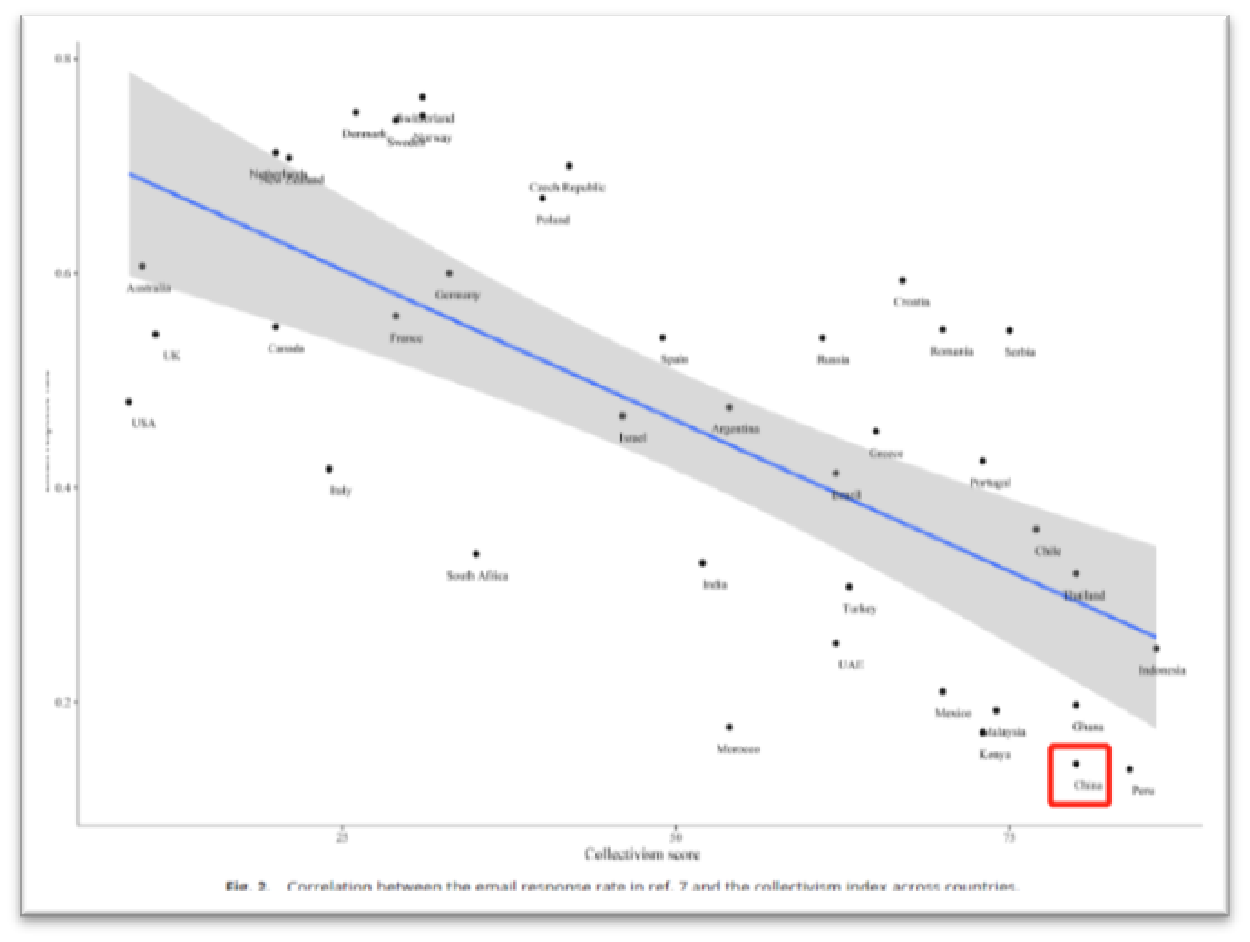
Screenshot about Part of Ranking in the Research of Cohn, et al.
In order to break through the "error filter" that the study imposes on Chinese citizens, Professor Xinyue ZHOU from Zhejiang University School of Management and Professor Qian Yang from Zhejiang University School of Public Health have conducted in-depth research on the issue.
On July 10, 2023, they published an exciting discovery in the top international journal Proceedings of the National Academy of Sciences of the United States of America (PNAS).
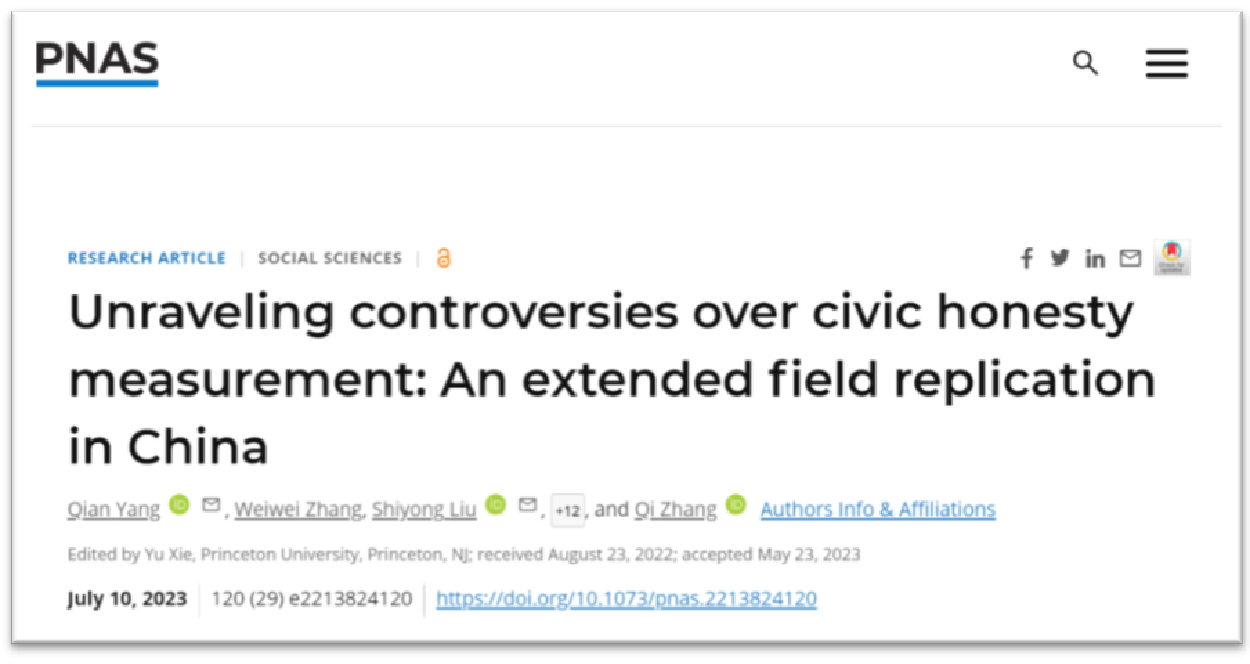
Note: Professor Xinyue ZHOU is one of the corresponding authors of the paper, and Professor Qian Yang is the first author of the paper.
Click on “Read original text” in the lower left corner at the end of the article to read the full text of the article.
They use more elaborate research methods and data to prove that the honesty level of Chinese citizens is much higher than in the research findings of Cohn, et al.
Science, the leading international journal, recently reported this discovery. The misunderstanding of foreign scholars about the integrity of Chinese citizens will be corrected.
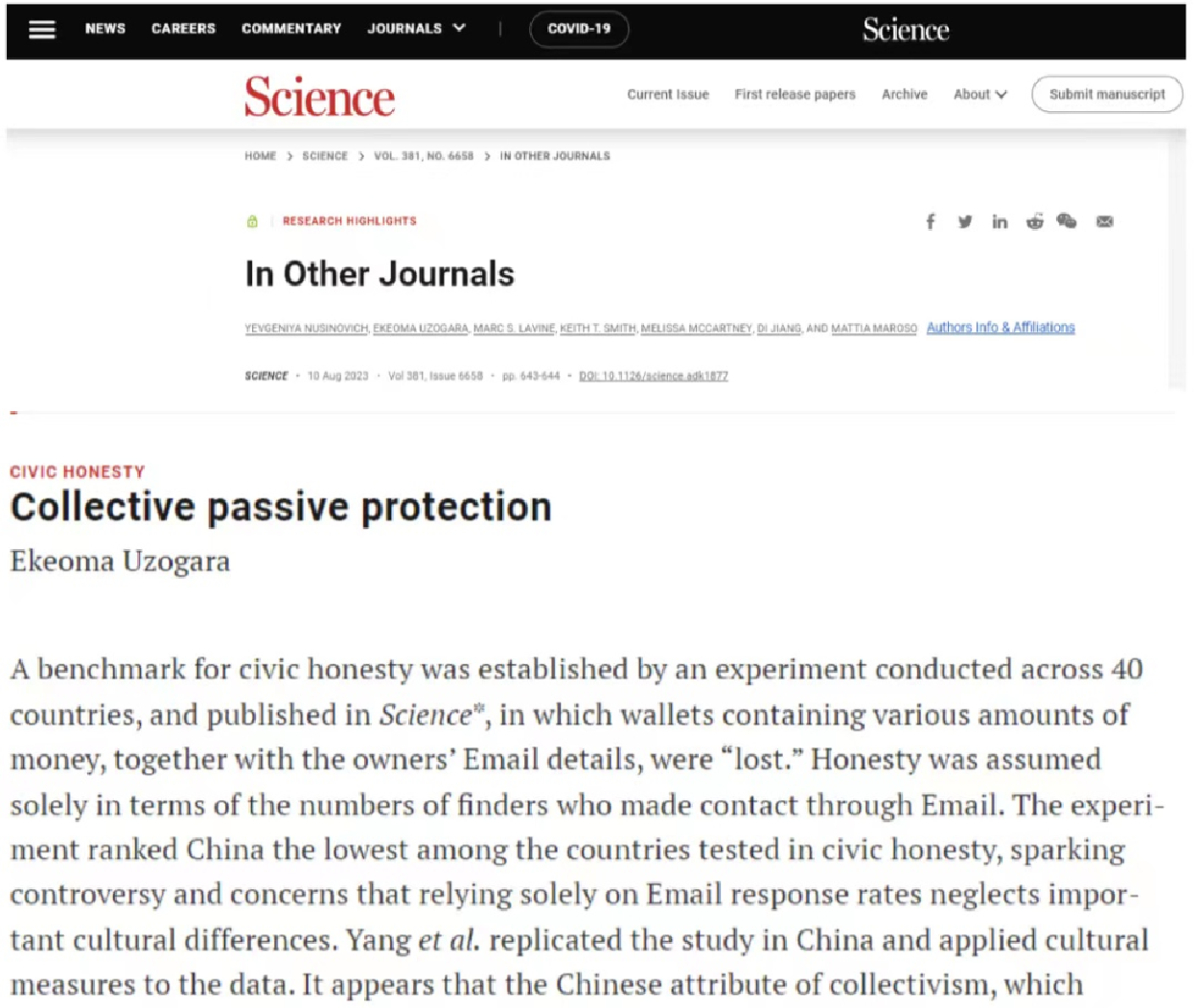
Screenshot of Report by Science
Why is the honesty of Chinese citizens so low in the Cohn et al. study? How does the study by Xinyue ZHOU and her team confirm the honesty level of Chinese citizens?
|
Xinyue ZHOU | 周欣悦 School of Management, Zhejiang University |
||
|
|
||
|
|
|
Academic Background: Dean, Professor, and Doctoral Supervisor of Marketing Department, School of Management, Zhejiang University. Research areas: Consumer psychology, psychological and behavioral consequences of money, social cognition of nostalgia You can learn more about Prof. Xinyue ZHOU’s academic background here |
|
They Have Confirmed that the "Email Response Rate" Does Not Reflect the Honesty of Chinese Citizens |
Xinyue ZHOU and her team noted that Cohn et al. research concluded that "Chinese citizens ranked last in honesty" because they did not fully consider the cultural and social norms of different regions and only relied on "email response rate" as a general indicator to measure civic honesty.
|
" |
‘Without trust, people cannot stand firm in the world’. Honesty has been the basis of Chinese people’s actions since ancient times and is also the traditional virtue of the Chinese nation. If a Chinese citizen does not contact the owner by email after finding the wallet, it does not mean that he/she is dishonest, because the person can find the owner by other means." |
Xinyue ZHOU and her team believe that the research results of Cohn et al. are at odds with traditional Chinese culture and do not consider the cultural differences in the various experimental areas. There is an urgent need to uncover the differences in the definition of "honest behavior" under distinct cultural backgrounds through further research.

|
©千库网 | Qianku Network |
Due to the many controversies raised by Cohn et al. research, Xinyue ZHOU and her collaborative team launched a multi-center (10 cities) field experiment in the summer of 2019 and teamed up with more than 100 teachers, students, and foreign research assistants from 15 universities to replicate Cohn et al. experiment.
Not only did they replicate the details of the research design in the Cohn et al. study, but they also incorporated a social culture perspective, adding and improving the design of the study by adding a "wallet recovery rate" instead of a single "email response rate" as an additional measure of civic honesty, observing the handling of lost wallets in real-time, and then conducting a formal survey of employees at these institutions to understand how they handled these wallets.
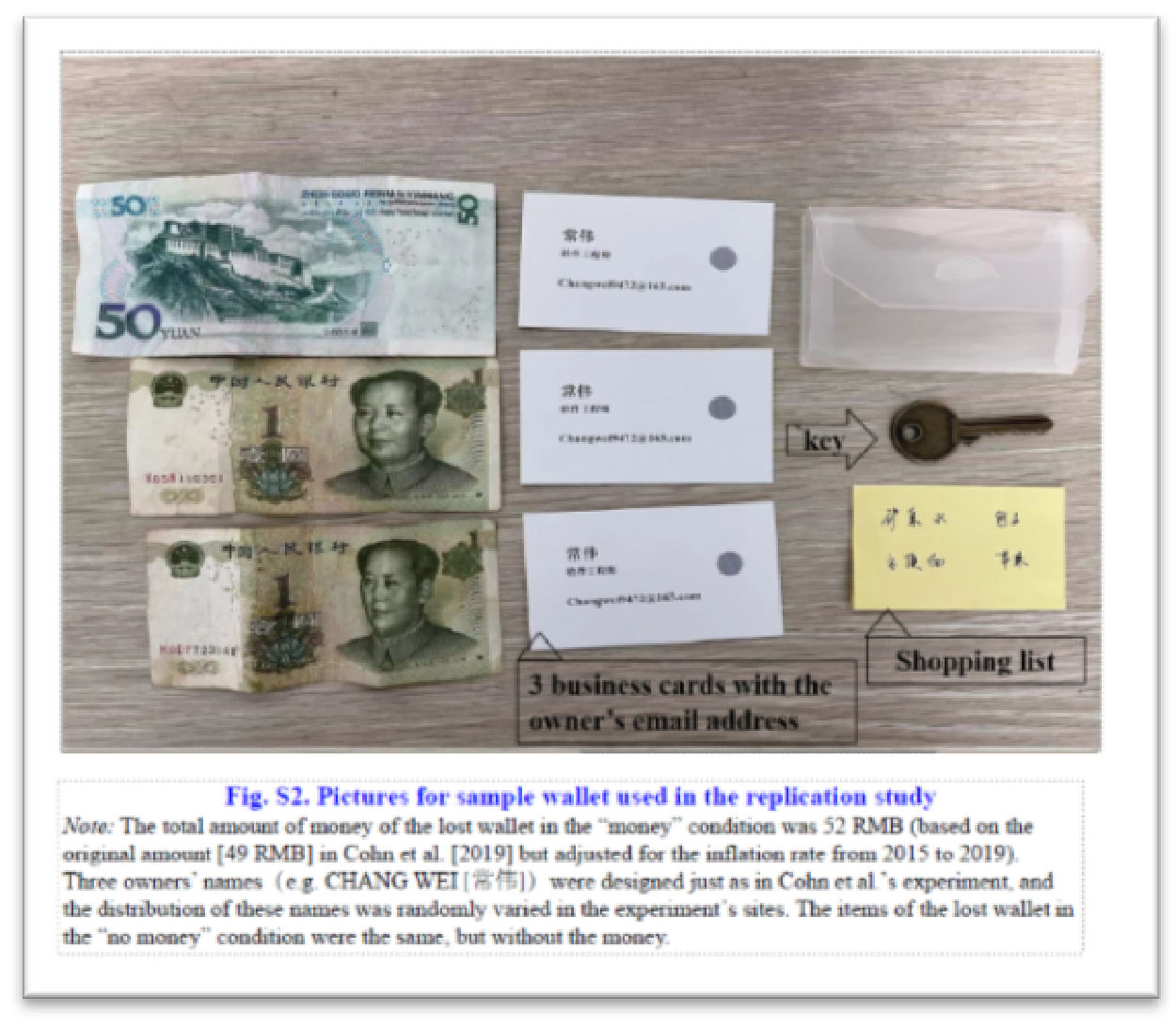
Based on the experimental study on the integrity of Chinese citizens using the two indicators of "e-mail response rate" and "wallet recovery rate", Xinyue ZHOU and her cooperative team found that if only e-mail response rate is used to measure "honesty", the conclusion is similar to the research results of Cohn et al. However, the e-mail response rate (27.4%) is far lower than the wallet recovery rate (77.8%), suggesting that the "e-mail response rate" does not truly reflect citizens’ honesty.

As seen in the data, the honesty level of Chinese citizens is much higher than the conclusion of Cohn et Al.
|
They Included the Cultural Dimension in Their Study, Thus Revealing the Underlying Flaws of Cohn et Al.’s Study |
To show the differences in the definition of "honest behavior" among diverse cultural backgrounds, Xinyue ZHOU and her team introduced “cultural dimensions”, namely individualism and collectivism.
This is because the cultural differences between individualism and collectivism may affect how citizens prioritize their actions when dealing with lost wallets, such as "actively contacting the owner of the wallet" or "passively keeping the wallet for the owner first".
After re-analyzing the research data from Cohn et al, Xinyue ZHOU and her team found another important conclusion, namely that the "email response rate" is negatively correlated with the collectivism index at the national level (r=-0.780, p < 0.01).
However, the results of their replication study in China show that the "wallet recovery rate" is positively correlated with the collectivism index in different regions of China (r=0.456, p < 0.001).
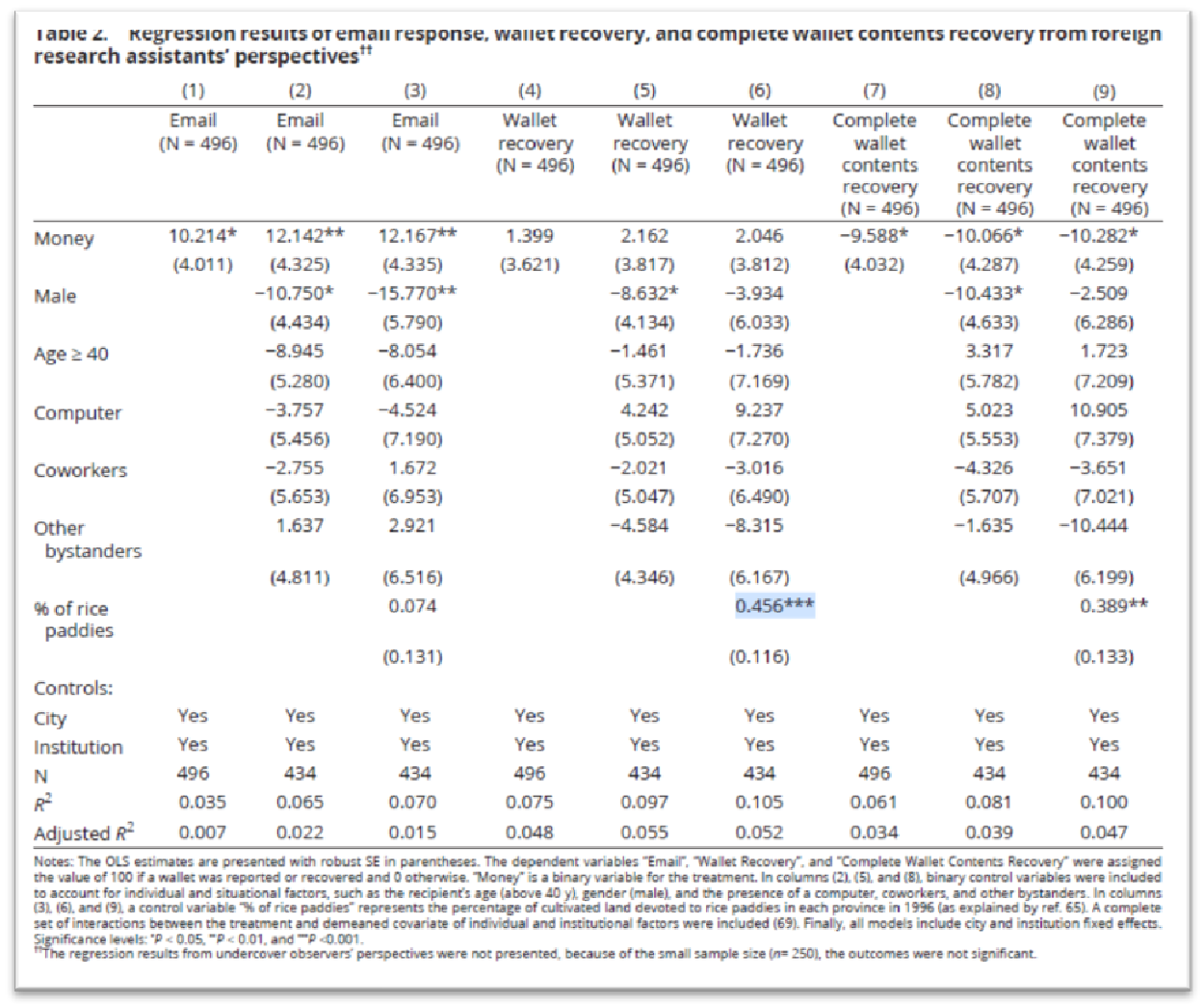
This important finding not only enriches our understanding of the meaning and extent of collectivist culture, but also reveals the underlying flaw of Cohn et al.’s research, i.e., Chinese citizens’ definition of "honesty" is influenced by collectivist culture, but Cohn et al.’s research does not take this cultural variable into account.
Xinyue ZHOU and her collaborative team said that in a collectivist culture such as China, superficial conservatism, caution, and self-restraint are valued more than external independence, sociality, and self-confidence; group functioning requires behavioral restriction, restraint, and obedience. Passive behavior such as "waiting for the owner to come" means restraint and self-discipline. It is therefore a mature and controlled behavior and can better represent honest behavior.
However, as an act of striving for autonomy, "voluntarily sending emails" is seen as discouraging by people in a collectivist culture and is therefore not suitable for representing honest behavior in that culture.
Thus, under the influence of collectivist culture, Chinese citizens are more inclined to keep the wallet properly for the owner and passively wait for the owner to find it, because this is the honest behavior that Chinese people advocate.
|
This Research Will Promote the Development of Related Theories and Strengthen "Cultural Self-Confidence" |
This research by Xinyue ZHOU and her team resolved the controversy over the use of e-mail response rate as the only indicator to measure civic honesty and introduced a cross-cultural perspective, proving the importance of cultural consideration in the study of measuring civic honesty.
Overcoming the one-sided conclusion from Cohn et al.’s study with scientific research based on multiple dimensions, they pointed out that in the "loss of wallet" research paradigm, in a collectivist culture, citizen-approved "honest" behavior should be better measured by "safe wallet storage"; in an individualist culture, building social interaction and "active contact" with wallet owners should be prioritized as desirable symbols.
|
" |
Potential individualism/collectivism may shape individuals’ beliefs about social norms, leading to different beliefs and behaviors about civic honesty in different cultures. It turns out that using a single indicator of integrity, especially one related to Western culture, underestimates the extent of integrity in collectivist cultures." |
Xinyue ZHOU and her team emphasized that a culturally sensitive and multidimensional approach should be adopted for the cross-cultural comparison of civic honesty.

|
©千库网 | Qianku Network |
In both behavioral and cross-cultural research, this study by Xinyue ZHOU and her team is of great theoretical innovation value and inspires the innovative design of research methods and variable indicators.
More importantly, this research helps to eliminate the misunderstanding of foreign scholars about the honesty of Chinese citizens, correct "cultural stereotypes" and enhance the "cultural self-confidence" of Chinese people.
As we all know, civic honesty is the key factor in maintaining an orderly and harmonious society. It reflects the reliability and moral behavior of individuals in fulfilling their civic duties and even affects the image and reputation of a country.

The journal "Nature" reports on Professor Xinyue ZHOU’s research on the psychology of money (source: Julie Glassberg, French photographer)
- The findings of Prof. ZHOU Xinyue and her team go a long way in minimizing the bias against Chinese honesty and remind researchers to consider the cultural background when conducting a study.
- You can read the original article in Chinese here